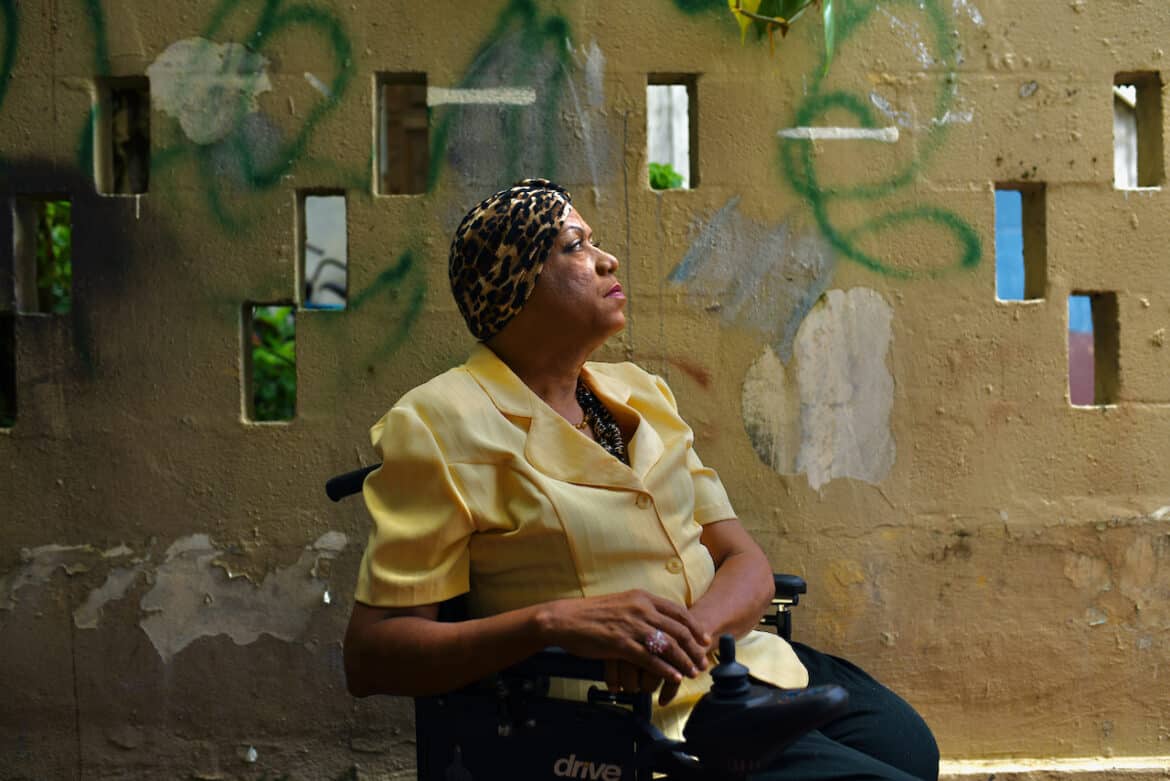Fabiola, an adult trans woman, has lived alone since she was 18 years old. Before reaching the age of 61 and the long-term care facility where she now resides, she had her own apartment in Río Piedras, a San Juan neighborhood. “I worked, I had an independent life,” she recounts. Among the LGBTQIA+ communities, she was recognized for her performances as a drag queen. She says she interpreted boleros from the repertoire of the fifties ballrooms Puerto Rico stars, Lucy Fabery and Ruth Fernández, and that with her shows she raised funds for the open doors church she attended.
But her health conditions, the amputation of her left leg at the knee and the absence of a family to care for her, forced her to depend on services and assistance. She now moves with the help of a wheelchair and waits for a prosthesis.
“When you lose your independence, it is very difficult, you lose your freedoms. The process was so fast that I didn’t have time to process it,” Fabiola shared with the Center for Investigative Journalism (CPI, in Spanish) and El Nuevo Día.
Prior to her arrival at an elderly home in San Juan, the social worker from the Department of the Family — who was in charge of finding a home for her and whose name Fabiola does not remember — told her there were centers that did not accept her because she was a trans person, she said. Where she has been living for about a year now, Fabiola said she is called by that name and is treated with respect, although she perceives the need for “more education.”
“That the people who work in the centers and in the Department of the Family be better prepared, that there be an openness that’s more in keeping with the times,” she said. Although she said she has not suffered discrimination where she currently lives, she stated that she fears that at some point this could happen, including discriminatory treatment from the relatives of other residents.
“There may be people or staff who are not instructed on how to treat us,” she said.
The administrator of the home where Fabiola lives, Ilsa Vargas, said they provide her with caring service and that the staff and the residents “have not expressed an opinion against her orientation,” but she said she will be “more attentive” to possible scenarios of discrimination by gender identity or sexual orientation that may come up.
“There’s like eight or nine of us, most don’t care, and she’s treated as anyone else. I’m certainly going to do a review and I’m going to be very aware of who can come up with comments or anything that goes against any orientation. The staff would not dare to be against these things in front of me,” Vargas said.
Wilfred Labiosa, director of the Waves Ahead organization, which offers services for older people from these populations and other vulnerable communities, explained that in 2015 he led a congress with other organizations aimed at identifying the needs of older adults in Lesbian, Gay, Bisexual, Trans, Queer, Intersex and Asexual (LGBTQIA+) populations. Labiosa said that during that congress it was evident the need for a safe home in which these persons feel comfortable.
“[LGBTQIA+ people] look for spaces where they have a little bit of their life, living it to the fullest,” he said.
Data from the 2020 Census revealed that Puerto Rico is the U.S. jurisdiction with the lowest percentage of LGBTQIA+ people (0.5%) or same-sex couples (0.2%) who reported having a home. Of the 1,340,534 couples households in Puerto Rico registered in the census, only 0.7% correspond to married or cohabiting same-sex couples.
The lack of access to housing for LGBTQIA+ populations in Puerto Rico gets worse as one gets older, people who work with these communities interviewed by the CPI and El Nuevo Día said.
Although there are protections aimed exclusively at older people in Puerto Rico, none directly mention older adults who self-identify as LGBTQIA+, the CPI and El Nuevo Día confirmed.
For example, the Bill of Rights and Public Policy for Older Adults (Act 121 of 2019) establishes general rights of “integrity, dignity and preference,” but does not address gender identity or sexual preference.
This law puts the responsibility of preventing, identifying, investigating, and supervising the treatment of any older adult who is a victim of negligence, institutional abuse, or by their family, on the Department of the Family.
The law also establishes the right to “a quality of life, freedom and without violence or physical or mental abuse, to ensure respect for their physical, psycho-emotional and sexual integrity;” and “to live in an environment of calm, respect and dignity that meets basic housing needs.
However, compliance with the law becomes complicated by the lack of statistics on the LGBTQIA+ populations and the disparity in the collection of complaints between the Department of Family and the Ombudsman for the Elderly (OPPEA), experts in matters related to these communities pointed out.
José Acarón Rodríguez, director of the Puerto Rico chapter of the American Association of Retired Persons (AARP), explained “there is never a way to reconcile the complaints, because [the Department of the] Family has some numbers and the Ombudsman for the Elderly [OPPEA] has others and there are times that the Ombudsman’s Office can classify it under three or four different areas.”
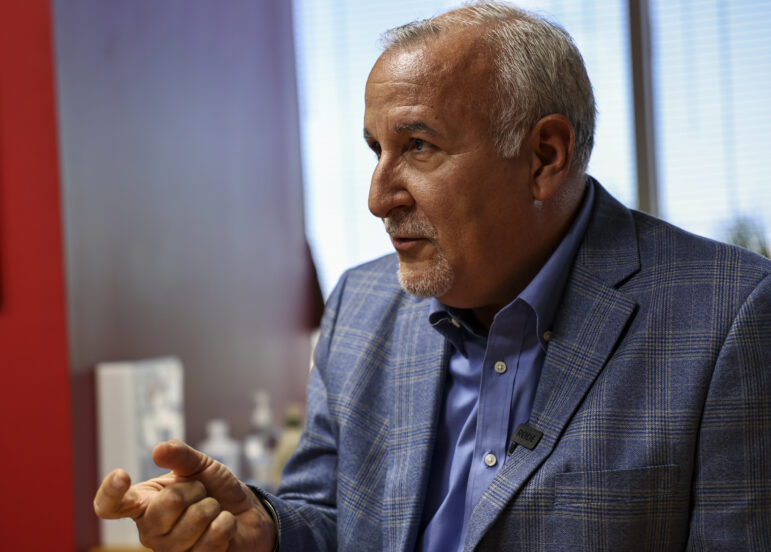
Photo by David Villafañe | El Nuevo Día
Regarding this disparity, the interim director of the Department of the Family’s Licensing Office, Bárbara González Nieves, said that a complaint module had been added to the Uniform Licensing System for File Management to resolve the matter.
However, in a subsequent request for information, she said, “the complaint module is under development” and that it would not be operational until at least mid-August.
“It’s a module that is being developed to add to our Uniform Establishment Licensing and Monitoring System (SULME, in Spanish). Several tests have been done jointly with OPPEA. An additional try will be needed to adapt to the module, one of the forms that the OPPEA uses to respond to the complaints,” she stated in writing.
Bills that promote the rights of older LGBTQIA+ adults in limbo
Between 2021 and 2022, the Legislature discussed and approved Senate Bill 427, authored by Sen. María de Lourdes Santiago, of the Puerto Rican Independence Party (PIP, in Spanish), and Sens. Ana Irma Rivera Lassén and Rafael Bernabe of the Citizens Victory Movement (MVC, in Spanish), to establish anti-discrimination public policy for older adults from LGBTQIA+ communities in housing through amendments to Act 121 and the Establishments for the Elderly Act (Act 94 of 1977).
Although the bill was sent to Governor Pedro Pierluisi for his signature, La Fortaleza sent the measure back in August and is still waiting for amendments suggested by the Executive.
“Returning measures are used to prevent a veto when there is the possibility from Fortaleza of reaching a consensus that eventually allows the governor to sign the legislative proposal,” the senator explained. “As of today, we don’t have a clear explanation of what Fortaleza is looking for,” she pointed out.
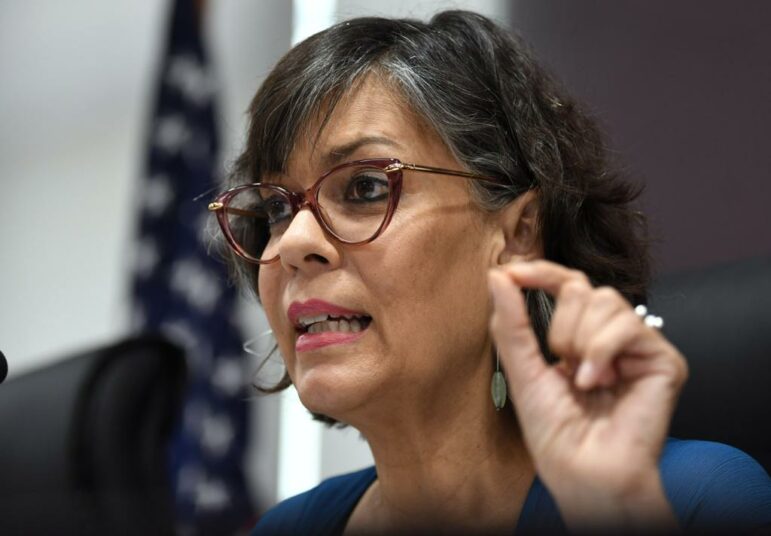
Photo provided by the Senate of Puerto Rico
La Fortaleza’s Deputy Secretary for Legislative Affairs, Carlos Rivera Justiniano, said in written statements that a “contradiction” was identified related to the period proposed by the legislative measure to adapt the regulations and instruction to the Department of the Family’s Licensing Office to issue a certification that would amend any curriculum or protocol.
Although La Fortaleza reported the alleged mistake, the adviser acknowledged that he never submitted a formal amendment. “We’ve been verifying how quickly the amendments can be worked to suggest specific language that, without risking interpretation problems, can be met,” said Rivera Justiniano.
In a follow-up response, Santiago assured that it was thanks to the request for information from this investigation that he learned about the error pointed out by La Fortaleza. “Now that we know which amendment Fortaleza is interested in, we’ll be working on it and [the measure] will be resubmitted,” Santiago said. As of press time, the Executive had not officially submitted an amendment proposal.
If Senate Bill 427 is approved, the amendment to Act 94 would require courses on the diversity of problems older LGBTQIA+ adults face in order to get the Training Certificate for the Development of Competencies in the Care of the Elderly, which is required to work in an elderly care facility.
González Nieves said these courses will not replace the revision of the Regulation for the licensing and supervision of elderly care establishments (Regulation 7349), which would add “the topic of sexuality” to the courses in socialization.
It would also require daycare centers to have an internal policy that prohibits discrimination based on real or perceived sexual orientation or gender identity for their residents and their workers.
The legislative measure still pending establishes that LGBTQIA+ people are a considerable sector of the growing population of older people in Puerto Rico “totally neglected by the government’s public policy.”
In addition, it indicates that discrimination against older adults based on sexual orientation or gender identity in care centers implies that this population may suffer “fear, intimidation, harassment, and abuse in those establishments.”
A survey by The National Senior Citizens Law Center titled “LGBT Older Adults in Long-Term Care Facilities: Stories from the Field,” revealed that older adults who identify as LGBTQIA+ and live in care facilities faced discrimination because of their sexual orientation and gender identity, real or perceived.
In the Legislature, the Bill of Rights of LGBTTIQ+ people (Senate Bill 485), authored by Sen. Ana Irma Rivera Lassén, is also awaiting a vote.
This measure maintains the general reference to LGBTQIA+ “people”, without specifically addressing the “older adults” population group.
Sen. Rivera Lassén said sexual orientation and gender identity are “intergenerational,” so “sexual orientation and gender identity has nothing to do with age.”
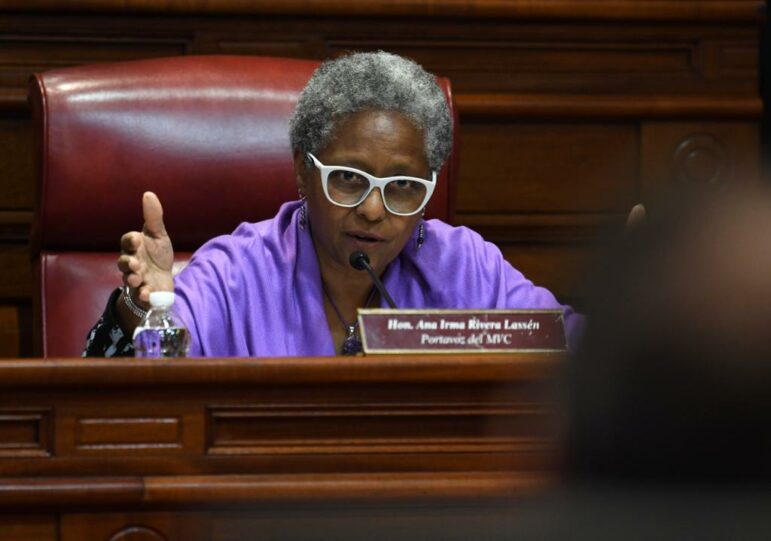
Photo provided by Senate of Puerto Rico
The bill — which is waiting before the Commission on Human Rights and Labor Affairs since late June 2021 — includes aspects such as “the right to decent housing, to be able to acquire, lease, dispose of their personal and real estate property without being discriminated against and vice versa.”
Rivera Lassén assured that, since its filing, the bill has been strengthened with reviews of literature, hearings, memoranda, input from agencies, and meetings with organizations, such as Waves Ahead. “It’s been moving very carefully to make it a strong bill,” she said.
Lack of housing begins with little access to care centers and elderly homes
Labiosa explained that in long-term care centers and elderly homes regulated by the Family and Housing departments, respectively, discrimination against people from LGBTQIA+ populations is often disguised by alleging that there are no spaces available, which makes it difficult for them to access housing.
He pointed out that sometimes the elements of discrimination in these places do not happen in an evident way. That was the case for a lesbian woman residing at Miramar Housing for the Elderly in San Juan who received services from Waves Ahead. As a matter of pride, she had placed a flag of the LGBTQIA + communities on the door of her apartment, a symbol that her administration ordered her to remove. After removing it from the door, since other residents had other types of flags in her windows, the woman then decided to place the flag in her window.
“They asked her to take it down as well,” Labiosa said. “The other flags remain on the windows and, in fact, if you go by there, you will see what I’m telling you, you will see the Dominican and the Puerto Rican [flags],” he said.
Waves Ahead also questioned why management took an unreasonable amount of time to move the woman into an apartment that, upon her arrival, she had requested in the apartment complex. For that move to take place, Waves Ahead had to write letters certifying the services the woman received.
Labiosa found it unnecessary to comply with this requirement for the move to be approved since the person was not a new resident seeking admission. All she wanted was to change apartments. Actions by the complex management that had the effect of complicating a simple process struck the Waves Ahead director as unspoken manifestations of discrimination.
“At the end of the day, I had to write a letter of support for her, her clinical person here had to write her another letter of support that she was receiving services, to move to an apartment on another floor with the same rate,” Labiosa said. The woman passed away during the COVID-19 pandemic.
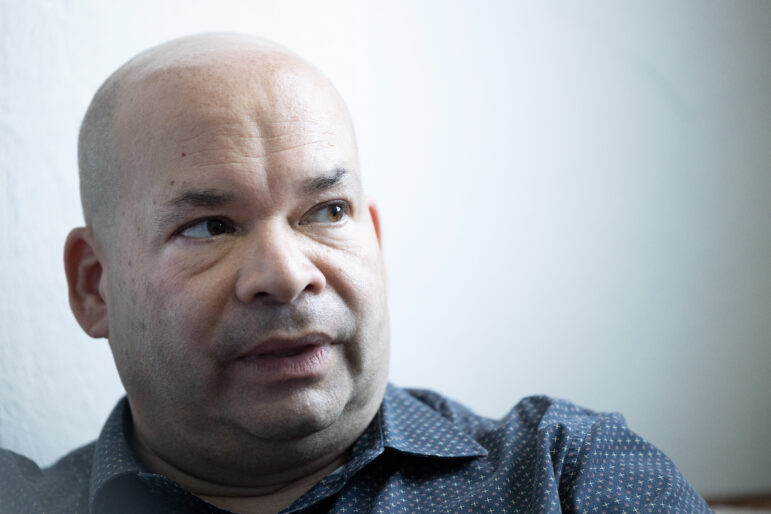
Photo by Vanessa Serra | El Nuevo Día
A few months after she moved into the new apartment, Waves Ahead was asked by the management to offer its training to the staff. “We provided training that, interestingly, the people who had more contact with the clients did not attend. The social worker never came in, the guard did not come in either, the gardener did not participate, and neither did the person who cleaned the halls,” Labiosa said.
The CPI and El Nuevo Día contacted Miramar Housing for the Elderly twice by telephone but received no response.
What does the federal law say?
In addition to being subsidized by the State Program for Rental Subsidies and Improvements for Housing for Low-Income Elderly (Act 173 of 1996), most of the elderly homes are regulated and receive funds from US Department of Housing and Urban Development (HUD) programs. “All these spaces are supposed to follow federal laws,” said the director of Waves Ahead.
Although local laws on protections for older adults do not specifically address LGBTQIA+ communities, at the federal level there is the Fair Housing Act, which applies to institutions that receive federal funds for housing, such as elderly homes, and that, among its provisions, prohibits discrimination based on sex, gender identity and sexual orientation.
“When those people [who manage elderly homes] receive the check from the federal government and they are depositing it, they must remember that these rules exist. Part of the training that we offer them is that this is in the federal regulations,” said Labiosa.
The law provides mechanisms for LGBTQIA+ people to complain to HUD, and the federal agency is obligated to investigate the complaint of “real or perceived” discrimination. The CPI and El Nuevo Día requested information from HUD regarding the number of complaints and their status, but at press time there was no response. For example, the “Equal Access to Housing in HUD Programs Regardless of Sexual Orientation or Gender Identity'' rule has been in force since February 2012.
Following the U.S. Supreme Court’s decision on June 15, 2020, in the case of Bostock v. Clayton County — which held that Title VII prohibits sex discrimination in employment and extends to sexual orientation and gender identity — President Joe Biden issued an executive order to prevent and combat discrimination based on gender identity or sexual orientation, which was applied to the Fair Housing Act.
Although there are bans at the federal level, Acarón Rodríguez said these provisions are directed more to owners and administrators, for which reason he reiterated that additional educational efforts are necessary to eliminate discrimination among residents.
Acting in the face of a housing shortage for LGBTQIA+ seniors
Given the slim prospects for affordable housing for LGBTQIA+ seniors, Waves Ahead will develop inclusive housing complexes. The first two will be in Cabo Rojo in the southwest, and Isabela on the northwestern coast, said Labiosa while explaining that these spaces will also be available for older adults who do not identify as LGBTQIA+.
“We aren’t going to discriminate, that is our focus,” he said.
In Isabela, the organization got the title to the Ciudad Dorada housing complex through a request made by the Municipality to the Department of Housing. Housing Secretary William Rodríguez Rodríguez said the transfer of this abandoned property to the organization was a step to provide housing to these populations.
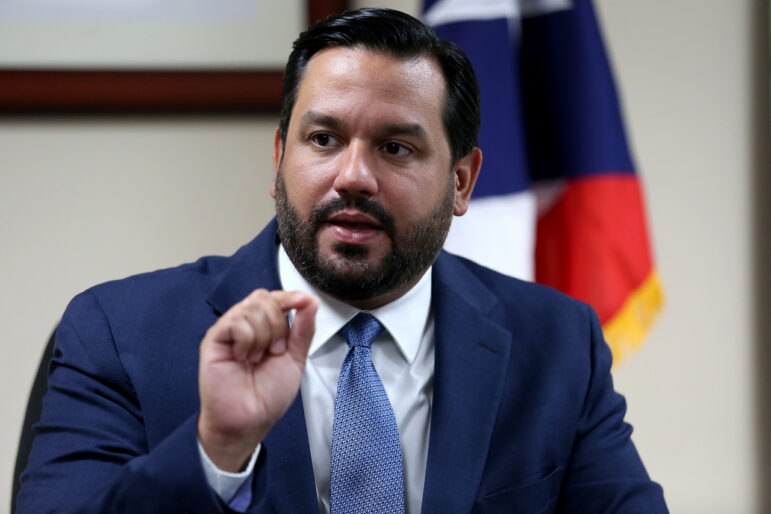
Photo by Gabriel López Albarrán | Centro de Periodismo Investigativo
Labiosa insisted that, just as the entity he directs achieved the transfer of this property, other organizations can develop projects of “fair and decent housing for the entire community,” if they are given access to structures in which large investments of money were made and are now in disuse.
As part of the remodeling in Ciudad Dorada, housing units will increase from 30 to 43, he explained. “We’re going to turn it into the diverse Ciudad Dorada. We already have the funds almost confirmed and we’re going to develop a project that doesn’t cost so much to revamp,” said Labiosa, who added that Waves Ahead would begin the process of applying for some type of subsidy through Housing, although they are still discussing the administrative details.
“We have no problem granting subsidies, they would have to apply. In the case of Section 8, for example, they are competitive processes that are carried out and they would have to participate in the competitive process and then request the corresponding subsidy,” said Rodríguez Rodríguez.
The AARP director also welcomed these types of initiatives because they create more housing alternatives for older adults.
“The important thing is that there must be all the alternatives for the person to decide what they want and where they can live comfortably and with dignity. That should be ideal, that people can have the final decision and have a society where everyone decides how to live and where to live,” he stated.
Meanwhile, González Nieves said these housing projects would be a positive contribution to serving both diverse populations and the lack of affordable housing.
“Perhaps it will cover a need that older adults have and who choose to live in an establishment like the one they propose. So, it is a matter of complying with the law and regulations, and they’re welcome because more and more places for older adults are needed,” she said.
This research is the result of a grant from the Center for Investigative Journalism’s Journalism Training Institute and was made possible in part with the support of the True Self Foundation.




